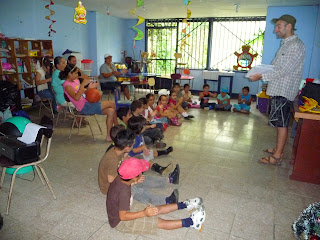Entering the latter portion of my time here, I am glad to report having come in step with the pace of work and life here. Days flitter on by, but ideas come through to reality in their time. Will their fruits be sweet? Like my newly bearing backyard tomatoes, the answer can’t be rushed, but I can throw a shovel of compost on it.
 |
| Drawing up observations from our habitat field trip with kindergarteners, comparing river and forest areas. |
On the work front, it is a sort of shifting rotation between tasks, literally in step with the lunar cycles. The nursery is picking up steam and giving me a chance to learn tidbits of plant propagation while resting my eyes from the computer. Overseeing the nursery, I scrounge up seeds and cuttings whenever I happen upon them, trying to time cuttings with the waning moon (menguante), when their ‘energy’ is directed root-ward. Waxing moon (creciente) is time to cut the grass and mulch, slowing re-growth. The last week we played with bamboo construction, building a no-mist recovery chamber (basically a low poly tunnel) for wildlings (wild seedlings) we will gather from the montaña next week, inspired by the success of our partners in the Philippines. Working early mornings and afternoons in our yard and that of neighborhood farms is great to round and the day, and to bank hours so I can take off to go surf.
Aside from updating of our website and the slow process of getting our plant database online, my office work has become largely focused on refining the Forest Garden Product (FGP) certification standard with Eduardo, in order to meet the International Federation of Organic Agricultural Movements’ (IFOAM) Common Objectives and Requirements of Organic Standards (COROS) – in other words to get recognized as a solid standard by the global grand-daddy of organic standards. The complexity and novel qualities of our production requirements, a lack of support from the creators of the standard, and our total inexperience in the realm of certification has given us a good challenge, as well as an opportunity for me to unleash my eye for detail. If you didn’t get enough acronyms already in this paragraph, we are hosting a workshop next week on Participatory Guarantee Systems (PGS), a means to ensuring quality production practices while reducing the need to involve costly third-party certifiers.
With Jana, our new artistically-gifted (among many other gifts) intern on the team, we’ve had the chance to awaken the creative juices as we conjure up icons to bring life to the AF principles. Jana has also been a serious enabler for eating really good food. Play-wise, if our lives are rather simple (not that I have any problem with surfing, yoga, mountain hike adventures, and endless swims), at least we eat ridiculously well. Seasonal harvests of pejibaye, caimito, manzana de agua; abundant backyard oranges, so sweet with the summer sun; fresh river shrimp; curry full of local spices and seasonings… we do alright.











